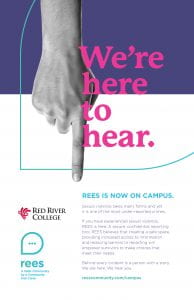College partners with province on solutions to COVID-related workforce challenges in education
The Manitoba government is taking action to bolster substitute teachers and educational assistants to sustain classroom education and supports through the 2020/21 school year, Education Minister Cliff Cullen announced today.
“As the pandemic continues and in-class learning continues we recognize the demand that this is placing on Manitoba’s classrooms,” said Cullen. “Manitoba Education, along with the Manitoba School Boards Association and school divisions, identified the need to address staffing shortages and reached out to Red River College to explore innovative ways to support in-class learning through the 2020/21 school year.”
The government will support two condensed training programs, created by the College in collaboration with the Manitoba Association of School Superintendents in response to the staffing needs identified by school divisions across the province. These programs are designed to provide consistent and quality training to the individuals hired by school divisions to address COVID-19 staffing challenges in Manitoba’s classrooms.
The Basic Classroom Skills for Limited Teaching Permit Holders program will provide short-term, basic training to prepare individuals hired on a temporary basis to successfully teach in a classroom environment. The Educational Assistant Essentials program will provide short-term, entry level training to new EAs who would then work under the direction of teaching staff.
“Our College community continues to draw on our unique experience and expertise — both with content development and highly skilled instruction in these areas — to create customized solutions to meet the urgent human resource challenges this pandemic presents across various sectors and industries,” said RRC President Fred Meier. “We will continue to leverage our skills and expertise to support critical and essential industries across Manitoba, and we are proud to work with our partners in the K-12 system to create solutions to address educational continuity and the pressing staffing needs identified by the Task Force as we navigate the home stretch of this unprecedented school year.”
Both programs draw on existing training provided by the College and will be offered online, both full-time and part time, in French and English, and will be accessible to individuals across Manitoba. Each program will be approximately 30 hours in duration.
School divisions will continue to hire interested, qualified individuals through their standard processes, and will refer candidates to Red River College for training. Intakes will begin January 18, 2021. School division job postings are available on the Manitoba School Boards Association’s website.
“We understand a key part of maintaining in-class learning during the COVID-19 pandemic requires that members of the school community remain home when sick,” said Cullen. “These programs are part of a $44-million commitment to assist, alongside hiring more teachers and staff and ensuring a safe and healthy learning environment for all students, teachers and staff.”









